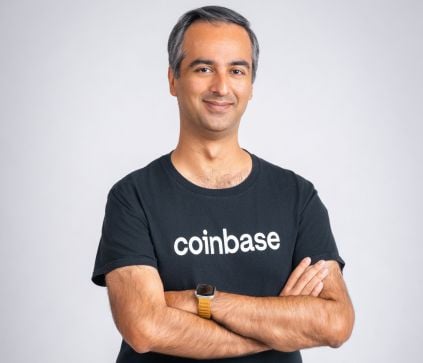Left to right: John O’Loghlen (Managing Director, APAC) and Hassan Ahmed (Country Director, Singapore).
Various initiatives over the past year indicated greater acceptance of crypto by traditional industries such as banking. For example, earlier this month, Standard Chartered started custody services for digital assets in the UAE with Brevan Howard Digital as its inaugural client.
Much closer to home in Singapore, the bank introduced crypto storage provider Zodia Custody last year.
According to Hassan Ahmed, Country Director, Singapore at Coinbase, in a recent interview with e27, all of these moves are “hugely beneficial” for the crypto industry.
He spoke about banks’ hesitancy to work with crypto companies and how their attitude changed once they realised clients’ demand for this.
“As banks go on that journey of studying digital assets and understanding their implications and potential for their business model, their clients also keep demanding for them to support digital assets so that they can have their investment portfolios in one place,” he explained at the sidelines of TOKEN2049 event in Singapore on September.
Also Read: Global Web3 companies on why Asia Pacific is the future of the industry
He pointed out how this space—where crypto and traditional banking merge–is still relatively small, leaving plenty of room for newcomers to enter and grow.
Outside of the banks’ involvement, Ahmed also commented on the prospect of crypto in Southeast Asia (SEA), which he dubbed a “very exciting” region for the industry. Many adoption surveys revealed that many SEA markets ranked on the top end of crypto adoption indices; each of these markets also has its own uniqueness.
This stresses the insight that SEA’s massive potential lies in its complexity. For example, Ahmed highlighted Indonesia’s regulatory transformation in recent years, which has cleared the pathway for crypto. He pointed out that today, for its 283 million population, there are roughly over 50 million e-wallet users in Indonesia, and the growth of crypto adoption is expected to follow the same trajectory.

Hassan Ahmed of Coinbase
“There is probably another five to six times of growth that can occur over the next few years in Indonesia,” he said.
Also Read: Navigating the future of Web3: Top trends shaping blockchain careers in 2024/25
Another exciting market in the region is the Philippines, which currently has three different use cases: crypto trading, blockchain-based remediation, and Web3 gaming.
“It’s a young population that has embraced different assets in a very meaningful way. Last cycle’s trend of Web3 games such as Axie Infinity persists today with new titles coming up; the youths want to embrace the new technology. It is encouraging to see.”
Meanwhile, markets such as Thailand and Vietnam are outstanding in the availability of talent and regulatory clarity.
What is next for crypto in SEA
Seeing these prospects, one might wonder how a crypto company can seize this opportunity. According to Hassan, one thing that companies need to remember is that while protocols might be global, the ecosystems that support them are local.
“If you’re trying to enter these markets, it’s really important to have the local and cultural context of what might be important,” he stressed, suggesting companies look at matters such as language translation and the hiring of local community managers.
When considering a new market, Hassan also suggested looking at regulatory clarity, such as the existing licensing regime.
When asked about up-and-coming innovations that Coinbase is excited about, Hassan focused on concepts related to asset custody and safeguarding.
Also Read: The rise of Web3 and crypto startups: Pioneering the decentralised future
“Especially post-FTX, that was a big breakup call, both for the industry and the regulators. Safeguarding assets and preventing any coal mining of funds is basic hygiene that exists in other financial services industries, but needs to be observed in the digital asset industry as well,” he closed.
“The Monetary Authority of Singapore (MAS) took note of that, and they did for some rulemaking that is coming into implementation very, very soon.”
—
Image Credit: Coinbase
The post Banking meets digital assets: Coinbase’s take on Southeast Asia’s thriving crypto landscape appeared first on e27.
